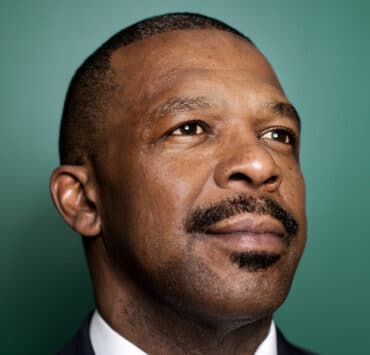Last December, Bristol Myers Squibb (BMS) announced its ambitious corporate sustainability goals. These went beyond mere New Year’s resolutions. These were big picture, decades-on goals.
Among them are a commitment for the company to purchase all of its electricity from renewable sources by 2030, and by 2040, be carbon neutral in its direct and indirect emissions, as well as reach its targets of equitable water use, zero landfill waste, and an entire fleet of electric vehicles.
This leading-edge agenda is one of the factors that brought Bill Pufko to BMS in October 2018. Pufko is BMS’ chief counsel for environment, occupational health, safety, and sustainability (EOHSS). “The company’s mission to deliver transformational medicine to patients around the globe really resonated with me,” he says. “The company is very passionate about well-being and improving and saving lives. We’re making important medicines that have very positive impacts on patients’ lives. I am just excited to be part of that mission.”
Pufko credits his mom, a dietician, and his father, who worked in the aerospace industry, with instilling in him a strong work ethic and prioritizing a work/life balance. “They both worked,” he says. “I saw how hard they worked and how committed they were to their jobs but even more so to our family. They had my schedule and my brother’s schedule, and somehow, they were always there for us. That is seared into my memory, watching them juggle work and family life.”
Pufko also cites sports coaches who challenged and pushed him. “Figuratively,” he jokes. “But they were all really good people from working class backgrounds. They instilled in me the notion of grit and determination. I remember them vividly: they left such an impression on me, and that carried over through college and here today.”
Today, Pufko uses that work ethic and determination to ensure that medicine development and delivery is done in compliance with EOHSS standards. Being responsible for all of BMS’ EOHSS legal matters in relation to manufacturing, research and development, and commercial operations, he is also charged with advancing a proactive approach to these issues, especially if it is related to safety.
“The safety of our workforce is our paramount concern,” he says. “We deal with the nuts and bolts of compliance, and safety is a major part of that. I also work on the EOHSS implications in our mergers and acquisitions because our deals often involve physical assets. There is diversity in my workload: compliance work, deal work, litigation. It makes my job a lot of fun. I never know what’s going to happen day to day.”
“The company is very passionate about well-being and improving and saving lives. We’re making important medicines that have very positive impacts on patients’ lives. I am just excited to be part of that mission.”
A recent reason for the variety in Pufko’s workload is BMS’ acquisitions of Celgene in 2019 and MyoKardia in 2020. The new, integrated company reported a revenue of $42.5 billion in its first full year, 2020. “EOHSS integration is a significant process,” Pufko says. “This has been a good opportunity to define our own culture as we bring these two companies together.”
That culture, he says, “is very much focused on our patients. With that patient-centric culture, compliance with environmental issues and the safety of our workforce, our contractors, and visitors to our site are important. We do the right thing. I know that sounds simplistic, but that is how we operate.”
As if working on integrating two large companies wasn’t challenging enough, COVID-19 threw a wrench in the plans that no one saw coming. But Pufko also takes pride in how BMS was able to keep its manufacturing plants running during the pandemic while meeting “a number of challenges, including, first and foremost, manufacturing BMS’ medicines while keeping the workforce safe with the guidance and processes we have in place,” he says.
BMS’ top medicines include Revlimid, a treatment option for multiple myeloma; Opdivo, a medicine that treats certain types of cancers; Eliquis, an anticoagulant medication used to treat and prevent blood clots; and Orencia, a medication used to treat autoimmune diseases. Getting these and the company’s other medicines to patients is what drives Pufko, he says.
“Our facilities are subject to many compliance requirements regarding air, water, waste, and various other EHS regulations. To the extent there are OSHA issues, those would be under my purview,” he says. “I know that everything I do has an impact on our company’s ability to deliver critical medicines.”
In regard to sustainability, Pufko examines the company’s goals and processes on a micro and long-term level, he says. “Sustainability is at the forefront of a lot of people’s minds, not just because it’s right to operate according to sustainability principles, but it’s a critical issue in the ESG investor world as well. Sustainability issues are present in our day-to-day operations and long-term operational goals, and they also play a role in other aspects of our business, such as sourcing and procurement because we want our partners to be aligned with our approach.”
Though the past year has been difficult, Pufko says that watching his team and the company at large work together to get things done has been especially satisfying. “I’m lucky get to work with many talented EOHSS professionals and subject matter experts here and around the globe,” he says. “It’s been a great privilege working with former Celgene and MyoKardia colleagues—there’s a good cultural cohesion forming. On the COVID front, it has been great to watch these dedicated people keeping operations going so that we can continue to deliver for our patients.”


